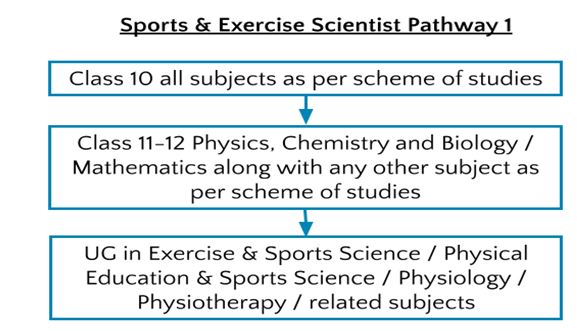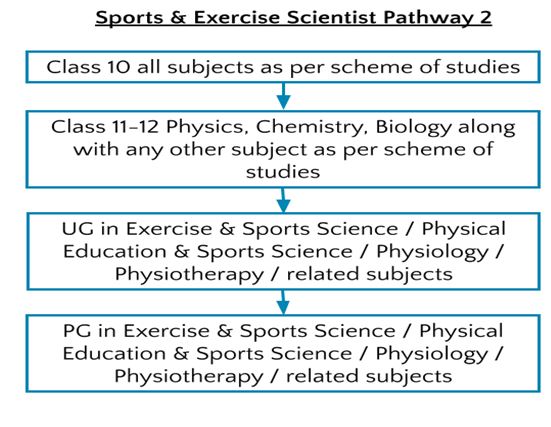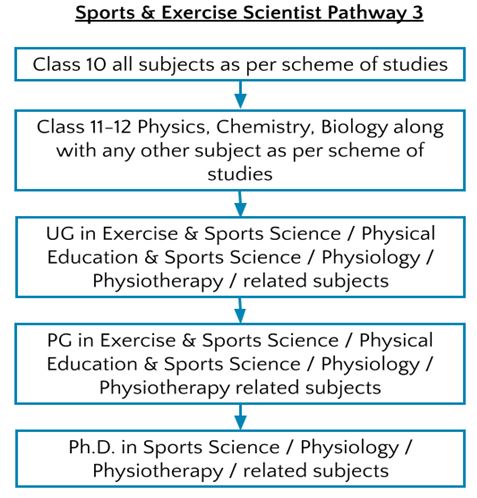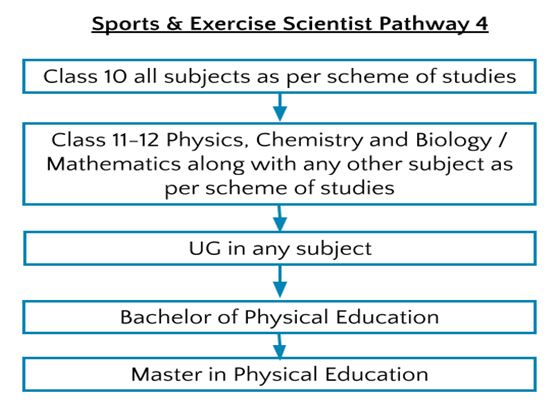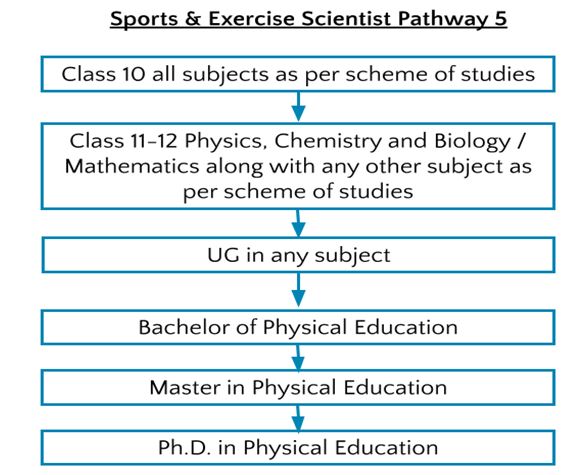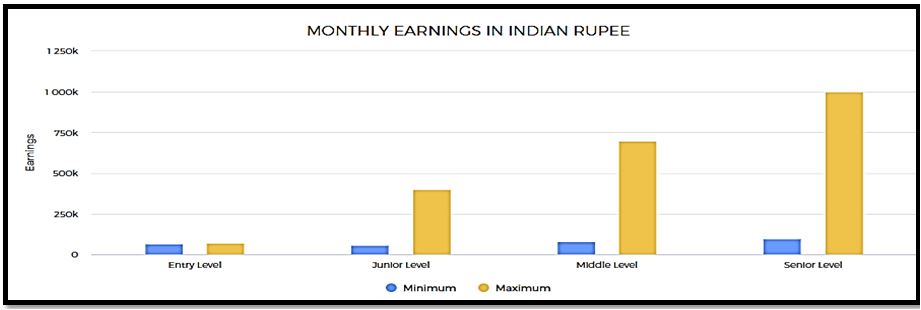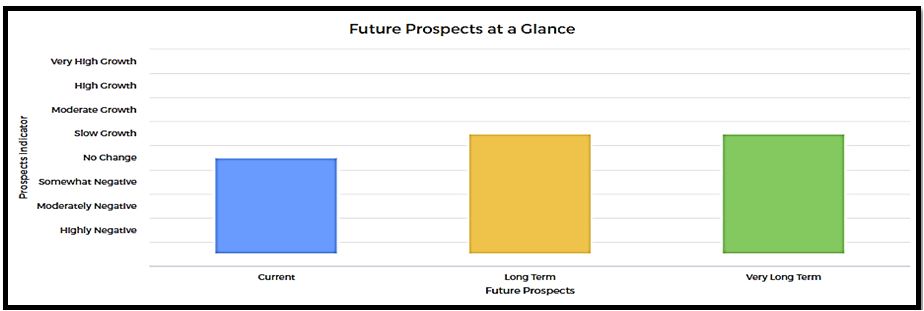Sports & Exercise Scientist
Entry Level Qualification
Graduate
Career Fields
Sports & Fitness
For Specially Abled





Career Entrance Exam
About Career
PARTICULARS | DESCRIPTION |
Name | Sports & Exercise Scientist |
Purpose | Develop Different Kinds of Exercise |
Career Field | Sports & Fitness |
Required Entrance Exam | CUET PG, IPU CET PG |
Average Salary | 800000 - 900000 Rs. Per Year |
Companies For You | SAAI, Netaji Subhas National Institute of Sports & Many More |
Who is Eligible | Graduate |
Sports and Exercise Scientists are experts who work to improve the overall health, physical fitness and performance of sportspersons. They provide health education, fitness regimen and exercise plans to sportsperson to improve their key health and fitness indicators. Exercise scientists assist sportspersons in achieving the best possible sporting performance by applying knowledge and techniques from the areas of Physiology, Exercise Physiology, Sports Psychology, Biomechanics, Biomedical Science, Biochemistry, Biokinetics, etc.
As a Sports and Exercise Scientist, you will assess, plan and implement different fitness programmers for sportspeople including physical activities and exercises to improve cardio respiratory function (breathing related), body mass composition, muscular strength, muscular endurance, or flexibility. You will assist sportsperson in achieving their best possible sporting performance by using your knowledge in the field of biomedical science, physiology, biomechanics (the study of human movement), nutrition, psychology, and sports performance assessment.
One very important work of the Sports and Exercise Scientist is researching in the areas of exercise physiology, biomechanics, sports nutrition, etc. Their studies and research help develop knowledge and insights on how to enhance sportspersons’ performance, how to keep them fit and how to rehabilitate them after injuries. As a Sports & Exercise Scientist, you will be working to provide answers to these questions:
1. How does the human body respond to exercise?
2. How can potential athletes maximize potential?
3. What are the benefits of regular exercise?
4. How do psychological factors influence sports and exercise performance?
Key roles and responsibilities
As a Sports and Exercise Scientist, you will have several specializations. However, each of these specialises will have a few of all of these roles and responsibilities:
1. You will develop different kinds of exercise to improve the strength, flexibility, endurance or circulating functions of the sportsperson.
2. You will follow the science standards, regulations, etc. while treating any sports person.
3. You will explain each and every exercise program or physiological testing process that a sports person takes.
4. Prescribe individualized exercise programs and fitness regimen, specifying equipment such as a treadmill, exercise bicycle, ergometers, or perceptual goggles.
5. You will review the performance of athletes so that you can evaluate their progress and change the treatment as needed.
6. If the sportsperson is going through any physical distress during exercise or workout, you will prove them with necessary emergency medical care.
7. Before working with any sports person, you will check the medical history and determine the best possible treatment.
8. You will keep a check on the nutrients taken by sports person and advise them on the diet that will help them with strength, endurance, etc.
9. You will ensure that a sports person does not take any drug that is prohibited by the law.
10. You will monitor the body of sportsperson and recognise and evaluate any injury that might occur.
11. You will develop and carry out rehabilitation programs for injured athletes
Career Entry Pathway
Class 10 all subjects as per scheme of studies– Class 11-12 Physics, Chemistry and Biology / Mathematics along with any other subject as per scheme of studies – UG in Exercise & Sports Science / Physical Education & Sports Science / Physiology / Physiotherapy / related subjects
After Class 11-12 Physics, Chemistry and Biology / Mathematics along with any other subject as per scheme of studies and then study for an undergraduate degree in Exercise & Sports Science / Physical Education & Sports Science / Physiology / Physiotherapy / related subjects.
Class 10 all subjects as per scheme of studies– Class 11-12 Physics, Chemistry, Biology along with any other subject as per scheme of studies – UG in Exercise & Sports Science / Physical Education & Sports Science / Physiology / Physiotherapy / related subjects – PG in Exercise & Sports Science / Physical Education & Sports Science / Physiology / Physiotherapy / related subjects
After Class 11-12 Physics, Chemistry, Biology along with any other subject as per scheme of studies and then study for an undergraduate degree in Exercise & Sports Science / Physical Education & Sports Science / Physiology / Physiotherapy / related subjects. Then you can go for a Post Graduate degree in Exercise & Sports Science / Physical Education & Sports Science / Physiology / Physiotherapy / related subjects.
Class 10 all subjects as per scheme of studies– Class 11-12 Physics, Chemistry, Biology along with any other subject as per scheme of studies – UG in Exercise & Sports Science / Physical Education & Sports Science / Physiology / Physiotherapy / related subjects – PG in Exercise & Sports Science / Physical Education & Sports Science / Physiology / Physiotherapy related subjects – Ph.D. in Sports Science / Physiology / Physiotherapy / related subjects
After Class 11-12 Physics, Chemistry, Biology along with any other subject as per scheme of studies and then study for an undergraduate degree in Exercise & Sports Science / Physical Education & Sports Science / Physiology / Physiotherapy / related subjects. Then you can go for a Post Graduate degree in Exercise & Sports Science / Physical Education & Sports Science / Physiology / Physiotherapy / related subjects. After your postgraduate, you can take a Ph.D. course in Sports Science / Physiology / Physiology / Physiotherapy/ related subjects.
Class 10 all subjects as per scheme of studies– Class 11-12 Physics, Chemistry and Biology / Mathematics along with any other subject as per scheme of studies– UG in any subject – Bachelor of Physical Education – Master in Physical Education
After Class 11-12 Physics, Chemistry and Biology / Mathematics along with any other subject as per scheme of studies and then study for an undergraduate degree in any subject. After your Bachelor degree, you can take another Bachelor course in Physical Education. You can either take a dual degree where both bachelor courses are taken together after 12th. Or you may first finish your bachelor and then take B.P.Ed. After then you can take a course of Master in Physical Education.
Class 10 all subjects as per scheme of studies– Class 11-12 Physics, Chemistry and Biology / Mathematics along with any other subject as per scheme of studies– UG in any subject – Bachelor of Physical Education – Master in Physical Education – Ph.D. in Physical Education
After Class 11-12 Physics, Chemistry and Biology / Mathematics along with any other subject as per scheme of studies and then study for an undergraduate degree in any subject. After your Bachelor degree, you can take another Bachelor course in Physical Education. You can either take a dual degree where both bachelor courses are taken together after 12th. Or you may first finish your bachelor and then take B.P.Ed. After then you can take a course of Master in Physical Education. After the Master’s course, you can take a Ph.D. in Physical Education.
Required Qualification & Competencies
Undergraduate studies after school
To become a Sports and Exercise Scientist, you may take two routes:
1. You can either take a bachelor’s course in Sports Science, Physiology, Sports Physiology, Physiotherapy, and Sports Science and a similar course.
Or
2. you can graduate with any other subjects combined with a dual degree in Physical Education.
Post Graduate and Doctoral studies
After finishing your undergraduate degree, you can take a post-graduation course in Sports Science with specialization in Exercise Physiology / Exercise Science / Human Performance / Kinesiology / Physical Activity & Health Studies / Sports and Exercise Sciences / Sports Biomechanics / etc.
Post-Doctoral studies:
You can also go for a Ph.D. after completing your master’s degree
COMPETENCIES REQUIRED
You should have the following occupational interests:
Social: You should have interests for Social Occupations. Social occupations involve helping or assisting others; these involve working with and communicating with people to provide various services; these may involve educating and advising others.
Investigative: You should have interests for Investigative Occupations. Investigative occupations involve working with ideas and quite a lot of thinking, often abstract or conceptual thinking. These involve learning about facts and figures; involve the use of data analysis, assessment of situations, decision making and problem-solving.
Realistic: You should have interests for Realistic Occupations. Realistic occupations involve more practical and hands-on activities than paperwork or office work. Realistic occupations often involve physical activities for getting things done using various tools and equipment.
Following personality attributes are required:
1. You are always or mostly disciplined in your action and behavior.
2. You are always practical or in most situations.
3. You are always or mostly care about your actions and behavior.
4. You are always or mostly helpful to others.
5. You are always or mostly caring, supportive, sympathetic and kind to others.
You should have the following skills and knowledge:
Instruction: Skills in training others how to do something.
Active listening: Giving full attention to what other people are saying, understanding the points being made by others, asking questions, etc.
Critical Thinking: Skills in the analysis of complex situations, using logic and reasoning to understand the situations and take appropriate actions or make interpretations and inferences.
Reading Comprehension: Skills in understanding written sentences and paragraphs in work related documents.
Personal care service: Knowledge of how to provide various assistance and services to others. This includes looking after the needs of individuals, understanding what they need and provide all assistance at home or elsewhere.
Education & Training: Knowledge of various principles and methods of developing training or teaching curriculum, the design of instructional methods, developing course materials, teaching and giving instruction individuals and groups.
Biological Sciences: Knowledge of plants and animals, their anatomical structure, cell structure, tissues, physiological functions, evolution, and all other related aspects.
You should have the following aptitudes and abilities:
1. The ability to listen to and understand information and ideas presented through spoken words and sentences.
2. The ability to communicate information and ideas in speaking so others will understand.
3. The ability to apply general rules and common logic to specific problems to produce answers that are logical and make sense. For example, understanding the reasons behind an event or a situation using general rules and common logic.
4. The ability to read and understand information and ideas presented in writing.
5. The ability to combine pieces of information from various sources, concepts, and theories to form general rules or conclusions. For example, analysing various events or situations to come out with a set of rules or conclusions.
Career - Job Opportunities & Profiles
1. You can join a sports team as their assistant medical expert or sports scientist.
2. Join hospital as a Sports Scientist (assistant) mostly in Exercise Physiology and Sports Biomechanics research (working with Orthopedics, Sports Medicine Consultants and Physiotherapists treating injuries and port injury rehabilitation).
3. You may also join as a sports scientist with different sports training institutes and rehab centres.
4. Most of the universities and college will hire you as a professor at the position of Junior Professor or Assistant Professor.
5. If you are into research, then you will be hired at the position of research associate. Ph.D. research fellows will be hired as a Junior Research Fellow.
You can find job opportunities at the following facilities:
1. International Sports team like Indian Cricket Team, Indian Hockey Team, etc.
2. IPL and domestic teams of various sports association like Wrestling, Weightlifting, Boxing, etc.
3. Sports Institutes like SAAI, Netaji Subhas National Institute of Sports, etc.
4. AIIMS hospitals in Delhi, Jodhpur, Uttarakhand, Ranchi, etc.
5. Government and private hospitals like SMS Jaipur, Lilawati in Mumbai, Apollo Hospitals, etc.
6. Sports Authority of India and all of its centres, teams, and coaching institutes.
SPECIALISATION TRACKS IN THIS CAREER
Kinesiologist
Kinesiologist specializes in the study and research of human body movements. As a Kinesiologist, you will work with athletes to address their physiological, biomechanical, and psychological dynamic principles and mechanisms of movement. Remember, different spinners in cricket have been called for illegal action? Like Harbhajan Singh. They take help from a kinesiologist to improve their action as kinesiologist would work on their hand movement. Kinesiologist uses this knowledge for biomechanics and orthopedics. They help in improving strength, sports psychology, rehab, etc.
Exercise Physiologist
Exercise Physiologists specialise in physical exercise. They understand the effect of exercise on body muscles and organs. They study these effects or changes on the muscular, cardiovascular, and neurohumoral systems of humans. Exercise Physiologists study the acute responses and chronic adaptations to a wide range of exercise conditions. They understand the effects of physical training and how the human body adapts to the training. Exercise Physiologists design and implement preventive care for a sportsperson when they do physical exercise or play a sport. They also create physical exercise programs for an individual sportsperson in order to keep her physically fit, strengthen her muscles, improve physical stamina, and raise her fitness level to match or exceed the standard fitness level required to play a sport.
Sports Nutritionists
Sports Nutritionists specialize in nutrition and diet of a sports person so that they can improve their performance. They focus on the study of different kind of nutrition, fluids, and food that is safe for the sportsperson. They also regulate the number of nutrients like Vitamins, minerals, supplements (energy supplements, performance-enhancing supplements and performance supplements), proteins carbohydrates and fats that should be part of the regular diet of the sportsperson.
Sports Biomechanics Expert
Sports Biomechanics combines the principles of Mechanics with Human Anatomy and physical movements to study and analyse the physical performance of humans. The principal object of Sports Biomechanics Expert is to improve the physical movements and performances of humans in reference to the requirement of various sports. Experts in this field are expected to work with individual players for quite some time, and understand their status of physical fitness at a level where bones, muscles, and joints work in coherence to bring about physical movements and motion. By understanding the conditions minutely, they can advise on methods to improve the conditions so that the best physical fitness for each individual is reached which bring about positive changes to sports performance. Sports Biomechanics Experts carry out such detailed analysis using computer simulation, mathematical modelling, kinematics, and many more principles of Mechanics and Human Anatomy. They also employ robotics, 3-D motion capture and medical imaging and accelerometry to analyse and study performance.
CAREER GROWTH
1. If you join a hospital as a Sports Scientist (assistant) then with progressive growth you will become Scientist, Senior Scientist, etc. (There will be grades if you are into a Government hospital).
2. The career growth in university and college states from Assistant Professor and then Associate Professor, Professor and Professor Emeritus. Professors can also get administrative positions such as Director/Dean/Vice Chancellor, etc.
Salary Offered
1. At the entry level, if you join as an assistant professor, you would be earning anything between Rs. 65,000 to 70,000. If you join hospitals as an assistant scientist, then you might earn anything between Rs. 60,000 to 70,000 per month.
2. At the junior level with a work experience of 2-6 years, you would be earning anything between Rs. 60,000 to 4,00,000 per month.
3. At the middle level with an experience of 6-12 years, you would be earning anything between Rs. 80,000 to 7,00,000 per month.
4. At the senior level of over 12 years of work experience, you would be earning anything between Rs. 1,00,000 to 10,00,000 per month.
MONTHLY EARNINGS IN INDIAN RUPEES
1. Entry level: 0 - 2 years of work experience
2. Junior Level: From 1 to 12 years of work experience
3. Mid Level: From 5 to 20+ years of work experience
4. Senior Level: From 10 to 25+ years of work experience (there could be exceptions in some high-end technical, financial, engineering, creative, management, sports, and other careers; also in the near future, people will reach these levels much faster in many careers and in some careers, these levels will have no meaning as those careers will be completely tech skill driven such as even now, there is almost no level in a Cyber Security Expert’s job)
Work Activities
As a Sports and Exercise Scientist, you will be having different roles and responsivities, based on them some of your work activities will be:
Getting Information: Observing, hearing, reading, using computers, or otherwise obtaining information and learning from it.
Developing & maintaining inter-personal relationships: Developing professional relationships with co-workers and others outside organizations and maintaining good relationships.
Updating & using relevant knowledge: Keeping updated with the latest knowledge relevant to your fields of work and use of the relevant knowledge in getting things done.
Assisting & caring for people: Assisting people in availing of services; taking care of people in different situations; offering help and services to others.
Performing physical activities: Performing physical activities that require the use of your arms and legs and moving your whole body, such as climbing, lifting, balancing, walking, stooping, and handling of materials.
Future Prospects
Indian Sports and health industry are on the rise, with Sports Ministry promoting sports through Khelo India, the attention is on different rising sports. The facility given to our sportsperson under Khelo India will mean more career opportunities for Sports Scientists, Physiologists, Trainers, and Nutritionists.
Also, until 2008, India had no major sports league. However, IPL changed the market of a sports league in India. After IPL started in 2008, India has seen major leagues in Badminton, Kabaddi, and Football. A further number of professional clubs and pro leagues in various sports in India are coming up. So, opportunities will increase. Indian pro clubs will increasingly be using various area of sports science for enhancing sports performance. Professionalism in sports (except in cricket) is comparatively new in India. But as other sports are also becoming professional (like football, hockey, kabaddi, badminton, etc.), there will be more requirements.
FUTURE PROSPECTS AT A GLANCE

